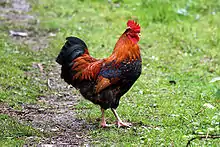gallu
See also: gallū
English
Alternative forms
Noun
gallu (plural gallus)
- Great demons or devils of the ancient Mesopotamian Underworld.
- A human adversary, one that is dangerous and implacable.
References
- Morris, John (1880) The new nation, Original from Oxford University, page 40& 311 (volume 3 of 5): “Gallu demon.”
Asturian
Corsican

Un gallu.
Pronunciation
- IPA(key): /ˈɡalːu/
- Hyphenation: gal‧lu
References
- “gallu, ghjallu, ghjaddu” in INFCOR: Banca di dati di a lingua corsa
Fula
Related terms
- gallude
References
- M. Niang, Pulaar-English English-Pulaar Standard Dictionary, New York: Hippocrene Books, 1997.
Laboya
Pronunciation
- IPA(key): [ˈɡalːu]
Welsh
Etymology
From Middle Welsh gallu, from Proto-Celtic *galnati (“to be able”). Cognate with Irish gal (“ardour, valour”) and Lithuanian galėti (“to be able”).[1]
Pronunciation
- (North Wales) IPA(key): /ˈɡaɬɨ/
- (South Wales) IPA(key): /ˈɡaɬi/
- Rhymes: -aɬɨ
Verb
gallu (first-person singular present gallaf)
- to be able to, can
- to have permission, can
- King, Gareth (1993) Modern Welsh: A Comprehensive Grammar (Routledge Grammars), London and New York: Routledge, →ISBN, page 202:
- Galli di fenthyg y llyfr ’ma ar ôl i mi ddefnyddio fe.
- You can borrow the book after I’ve used it.
- Synonym: cael
- King, Gareth (1993) Modern Welsh: A Comprehensive Grammar (Routledge Grammars), London and New York: Routledge, →ISBN, page 202:
Usage notes
- In the colloquial language, the preterite of this verb is almost never used; the past tense is rendered by means of the periphrastic imperfect, e.g. roedd e’n gallu (“he could, he was able to”).
- In the colloquial language, the future tense of this verb has a present-tense meaning as well, so galla i means both ‘I can’ and ‘I will be able to’.
Conjugation
Conjugation (literary)
| singular | plural | impersonal | ||||||
|---|---|---|---|---|---|---|---|---|
| first | second | third | first | second | third | |||
| present indicative/future | gallaf | gelli | gall, geill | gallwn | gellwch, gallwch | gallant | gellir | |
| imperfect (indicative/subjunctive)/ conditional |
gallwn | gallit | gallai | gallem | gallech | gallent | gellid | |
| preterite | gellais | gellaist | gallodd | gallasom | gallasoch | gallasant | gallwyd | |
| pluperfect | gallaswn | gallasit | gallasai | gallasem | gallasech | gallasent | gallasid, gallesid | |
| present subjunctive | gallwyf | gellych | gallo | gallom | galloch | gallont | galler | |
| imperative | — | gall | galled | gallwn | gellwch, gallwch | gallent | galler | |
| verbal noun | gallu | |||||||
| verbal adjectives | galledig galladwy | |||||||
Conjugation (colloquial)
| Inflected colloquial forms | singular | plural | ||||
|---|---|---|---|---|---|---|
| first | second | third | first | second | third | |
| future | galla i, gallaf i | galli di, gelli di | gall o/e/hi | gallwn ni | gallwch chi, gellwch chi | gallan nhw |
| conditional | gallwn i, gallswn i | gallet ti, gallset ti | gallai fo/fe/hi, gallsai fo/fe/hi | gallen ni, gallsen ni | gallech chi, gallsech chi | gallen nhw, gallsen nhw |
| preterite | gallais i, galles i | gallaist ti, gallest ti | gallodd o/e/hi | gallon ni | galloch chi | gallon nhw |
| imperative | — | galla | — | — | gallwch, gellwch | — |
| Note: All other forms are periphrastic, as usual in colloquial Welsh. | ||||||
Alternative verbal adjective forms:
- galluedig
- galluadwy
Alternative conditional forms:
- gallaswn/llaswn i (“I could, would be able”)
- gallaset/llaset ti (“you could, would be able”)
- gallasai/llasai fo/fe/hi (“he/she/it could, would be able”)
- gallasen/llasen ni (“we could, would be able”)
- gallasech/llasech chi (“you could, would be able”)
- gallasen/llasen nhw (“they could, would be able”)
Synonyms
- (be able to): medru (North Wales)
Antonyms
- anallu (“inability; impotence”)
Mutation
| Welsh mutation | |||
|---|---|---|---|
| radical | soft | nasal | aspirate |
| gallu | allu | ngallu | unchanged |
| Note: Some of these forms may be hypothetical. Not every possible mutated form of every word actually occurs. | |||
References
- Morris Jones, John (1913) A Welsh Grammar, Historical and Comparative, Oxford: Clarendon Press, § 100 iii (2)
Yogad
This article is issued from Wiktionary. The text is licensed under Creative Commons - Attribution - Sharealike. Additional terms may apply for the media files.